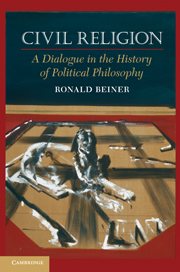Book contents
Preface and Acknowledgments
Published online by Cambridge University Press: 05 June 2012
Summary
[T]he style of dialogue and conversation … carries us, in a manner, into company; and unites the two greatest and purest pleasures of human life, study and society.
– David HumeTexts that are inertly of their time stay there: those which brush up unstintingly against historical constraints are the ones we keep with us, generation after generation.
– Edward SaidGreat thinkers tend to be full of surprises. Marvelous surprises come to light as political philosophers in the Western tradition confront the political challenge of religion: Machiavelli celebrates St. Francis of Assisi. Hobbes, who places a more radical emphasis upon individual self-preservation than any other thinker, extols the practice of Christian martyrdom. Rousseau, the great champion of republican freedom, praises the politics of Islam. Nietzsche, who is famous for his pronouncement that “God is dead,” is, according to the political structure of his argument, an emphatic theist. All of these thinkers, notwithstanding the fact that they have contributed to the radical secularization of modern politics, express not a little sympathy for some manner of theocracy.
The purpose of this book is to present a dialogue in the history of political philosophy. Political philosophy as a form of intellectual activity of course began historically with Socratic–Platonic dialogue. It can be argued that, for it to subsist as a living intellectual activity, political philosophy must continue to be a dialogical enterprise (and indeed, it is hard to imagine how political philosophy could be conceived otherwise). What is of interest to me here is a dialogue between leading figures in the history of modern political philosophy concerning the relationship between politics and religion. In some cases, interlocutors in this dialogue are consciously aware of other interlocutors; in other cases, I have reconstructed the dialogue as if the interlocutors were consciously addressing each other's arguments. I start the dialogue in the middle, as it were, for reasons that are more or less evident. The term “civil religion” (religion civile) itself owes its prominence in the history of political philosophy to an immensely powerful thirty-five-paragraph chapter at the end of Rousseau's masterpiece, Du Contrat Social. I treat this chapter by Rousseau as the center of gravity of the ambitious set of debates between political philosophers on the topic of religion and politics, and I treat the civil-religion question itself as a gateway to political philosophy as a distinct and uniquely ambitious form of intellectual activity.
- Type
- Chapter
- Information
- Civil ReligionA Dialogue in the History of Political Philosophy, pp. ix - xviPublisher: Cambridge University PressPrint publication year: 2010



